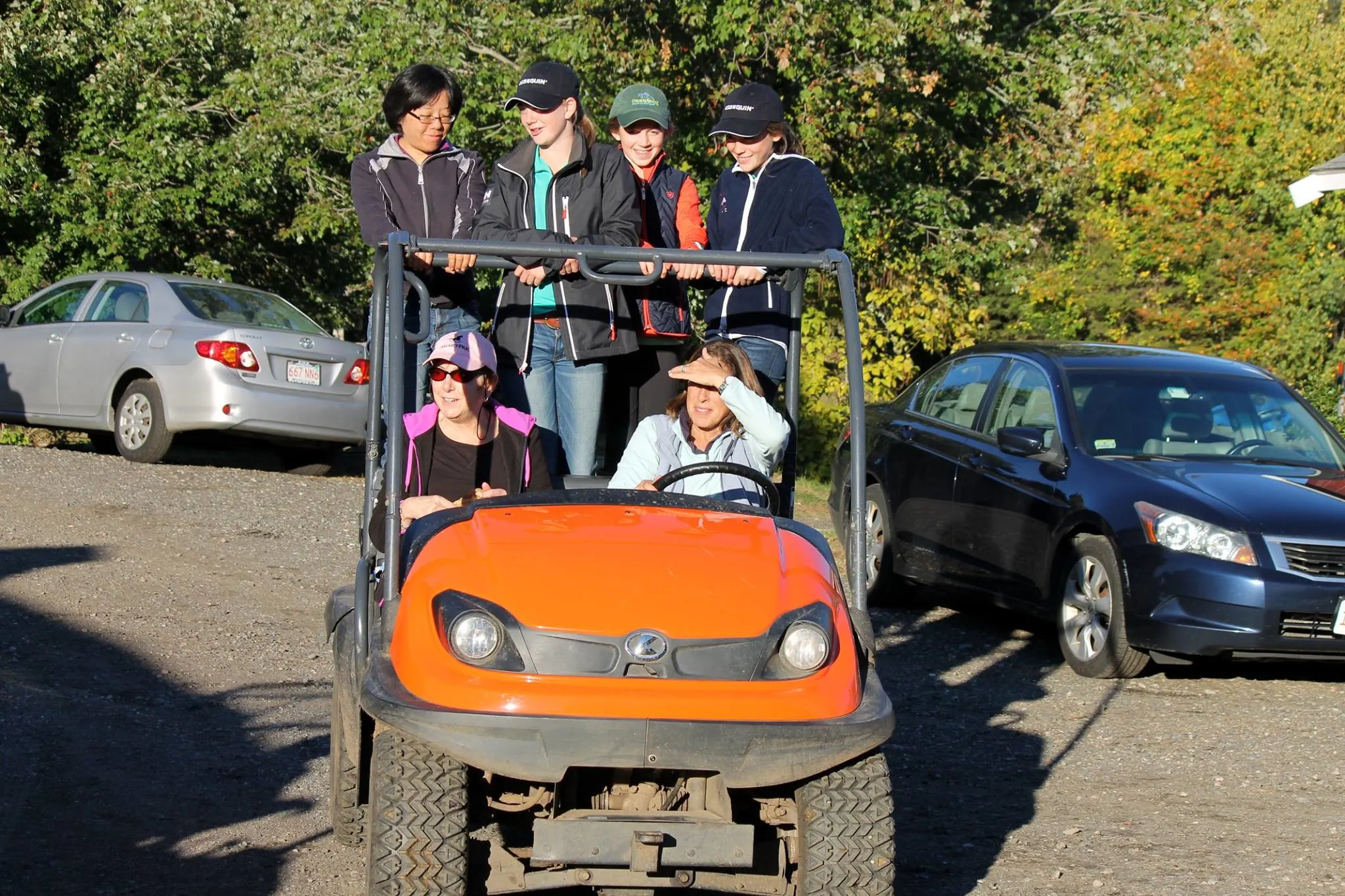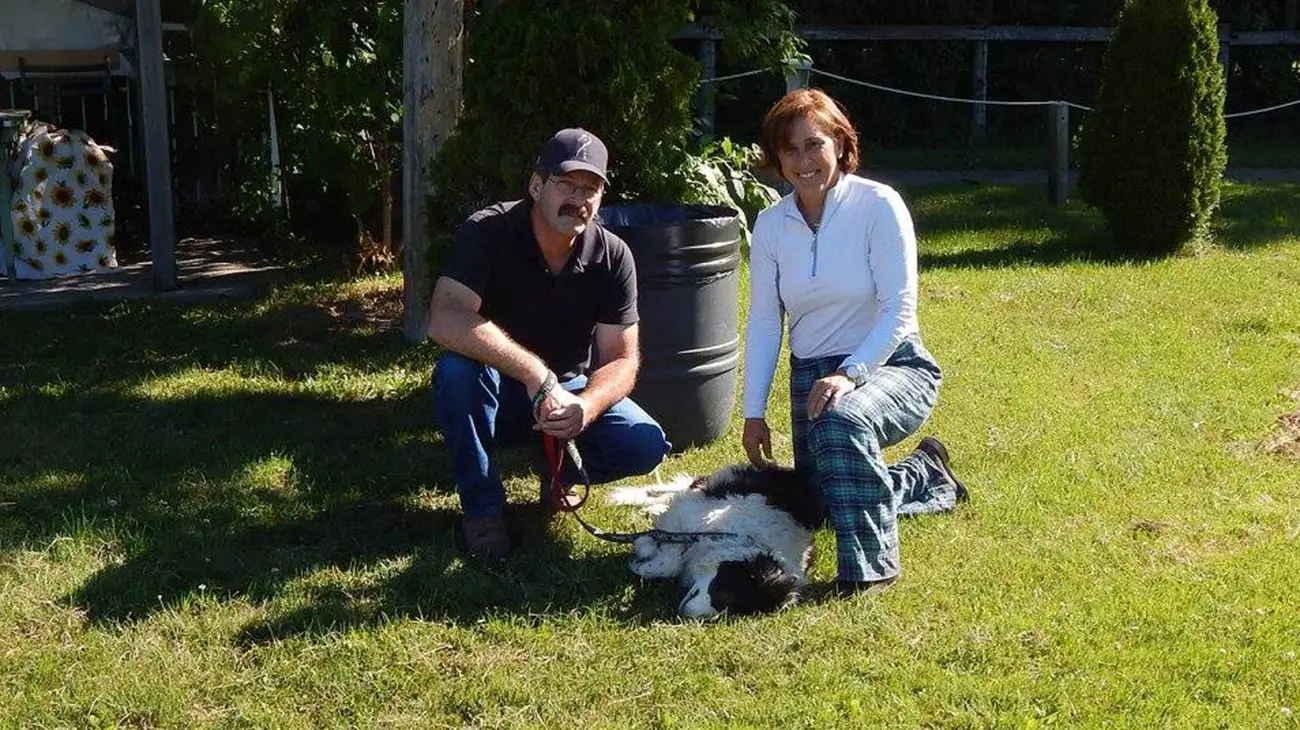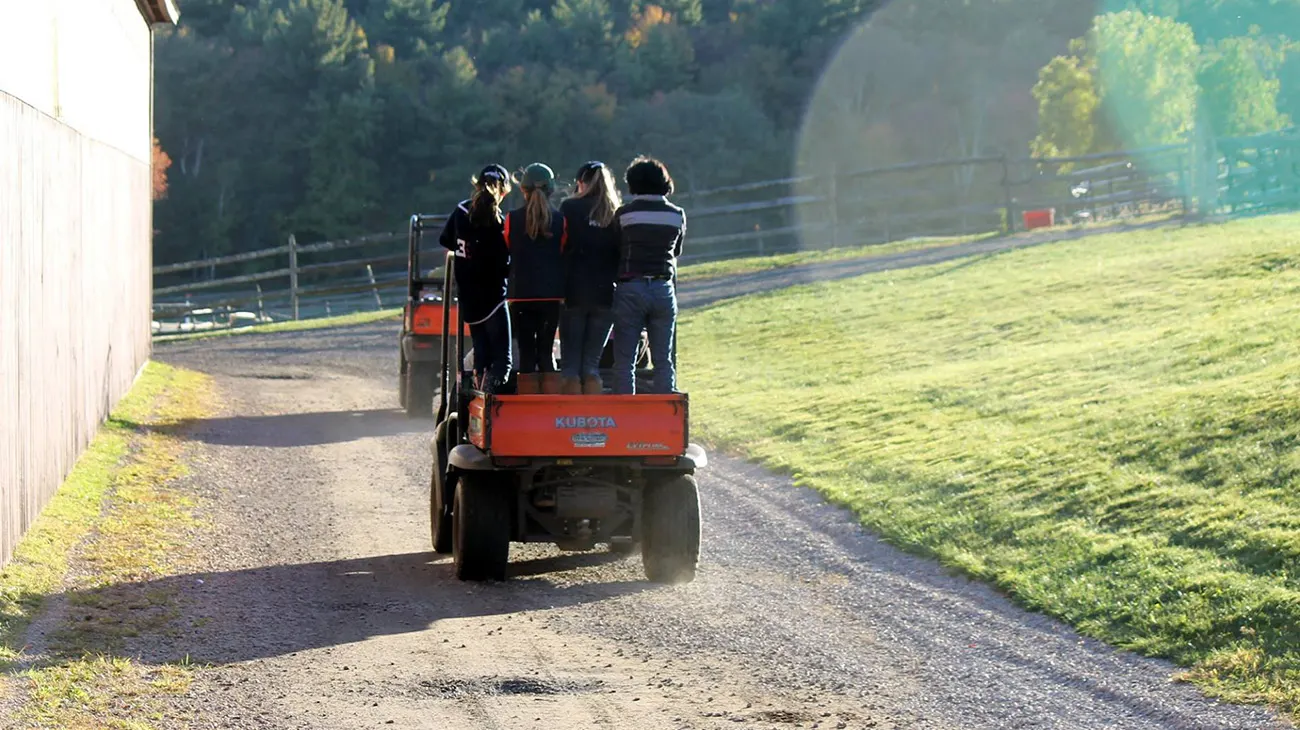“You can’t say you weren’t warned about Janet’s driving,” I tell myself as the Kubota slams into gear and races away, leaving me hanging on for dear life, feeling both terrified and exhilarated. I reach to steady myself as papers and clipboards get jostled in the seat next to me, and tears stream down my cheeks. The Kubota has no windshield, so I can’t tell if the tears are from the speed or because I am laughing so hard.
I am riding shotgun with Janet Sinclair, the volunteer coordinator for Course Brook Farm Horse Trials in Sherborn, Massachusetts. As the show organizer myself, it is part of my duties to be of service wherever there is a need, and Sinclair asked me for assistance on this particular show day because her regular “helper” had a conflict. On this crisp fall New England day, she is bundled against the cold. Her shoulder-length dark hair and olive complexion barely show beneath her winter hat. This isn’t her first rodeo.
“At least it’s not raining, because when it’s raining AND cold, that’s the worst. Hard to convince people to come back after that kind of weather,” she says with a grimace.

“What is the all-fired hurry?” I shout against the whipping wind.
“We have to get snacks to everyone and then run around the course to pick up scores!” Sinclair yells back.
Her enthusiasm is infectious, and I feel very important.
As we careen from station to station, checking in with officials and volunteers, I get the impression that Sinclair makes everyone she encounters feel important. The back of the Kubota is filled with coolers of water and soda and boxes of snacks and candy. Today, we also carry hand warmers with us. The comfort of the volunteers and officials is paramount. Continuing our mission at breakneck speed, it is hard to tell just by looking around that volunteerism in the sport of eventing has been declining. Across the country, and certainly in Area I, organizers have had difficulty finding and securing enough volunteers to operate their events. Not so for Course Brook Farm, and I am about to find out why Sinclair has been so successful in acquiring and retaining horse show helpers. When I ask her what she attributes to her success, she describes herself as “tenacious,” “creative,” and “full of ingenuity.”
“I’m pretty sure I get the tenacity from my dad,” she says. Richard “Dick” Nakashian founded the Bay State Provincetown Steamship Company, one of the first passenger ferry companies in Boston Harbor.
As we continue our frantic ride from station to station, I meet several of the volunteers: Sinclair’s cousin, her fitness trainer from the gym, her dental hygienist, a friend of a friend. I am intrigued. These are not horse people, so why are they volunteering at a horse show?
ADVERTISEMENT
“You never know who will volunteer unless you ask,” she says.
I’m not sure I would have the chutzpah to ask just anyone to volunteer at a horse show. Sinclair confesses that spending nearly 10 years running the Constitution Marina in Boston boosted her confidence.
“I was a woman in a man’s world,” she says, her eyes sparkling as she remembers one encounter. “Someone came into the marina looking for the manager, and I happened to be standing right there. I introduced myself as the manager, and they looked at me like I was crazy. They just couldn’t believe that a woman was in charge.”
Sinclair’s confidence plays an important role in acquiring and retaining good volunteers. No one is safe from her widely cast net. “Sometimes, a volunteer can only give a couple of hours,” she says, so she works to find a place for them. “They are reaching out because they want to help. I always try to accommodate anyone interested because you never know what it might lead to.”

As the noon hour approaches, we hightail it towards the food vendor, slowing only when we encounter a horse or person walking in our path. We collect and deliver prepared lunches for all the officials and volunteers, since timing usually does not allow people to leave their posts. We zip around from person to person offering the choices: fried chicken fingers, hot dogs, hamburgers, veggie burgers. Occasionally, there is a special request, which Sinclair meets with a promise that “We will be back soon!” The need for speed is apparent, and I grab the Kubota’s nearest handrail and pull my hat down tighter. Off we go!
“Hold on! I learned to drive in Boston,” Sinclair says with a laugh.
The pace remains intense as we deliver lunches and collect cross-country jump score sheets from each of about 20 jump judges. One judge lets us know her walkie-talkie isn’t working. We give her one of our extras and make a note to replenish our stock. Further along the course, another volunteer judge lets us know she is getting cold. We promise to bring her a blanket and give her some hand warmers to help stave off the chill until we get back.
As we continue racing towards the finish, a call comes in over the radio: “Jump 12: rider fall. Can we get a medic?” The voice sounds panicky. Sinclair does a quick about-face (so quick, I’m almost tossed from the Kubota), and we head out to assist. We’re all business now. As much as Sinclair loves her volunteers, she also loves the competitors and feels an enormous responsibility for their safety. On our approach to jump 12, we can see that the rider is back on her feet and her horse has been caught. The rules do not allow a competitor to continue after a fall even if she’s OK, so unfortunately, her competition has ended. We check in with the rider and judge and are relieved to get a thumbs up. Sinclair calls over the radio that all is OK with the rider and horse, and the show proceeds.
After delivering lunch and leaving the score sheets with the show secretary, we get our own moment of rest. As we regroup, I ask Sinclair how she got involved with this volunteer work. She tells me how her love of horses started when her mother brought her and a few friends for riding lessons at North Andover Riding Academy when she was 12. A lifelong passion ignited.
Sinclair recounts with a wry smile that she also started working for her father at the same age. He insisted that she would need to earn money if she wanted to continue riding lessons. Although she did not inherit her father’s love of boats, she learned many valuable life lessons from working for him for the next two decades, including the value of hard work, the value of a dollar, and the value of never giving up. At age 30, her weekly riding lessons turned into leasing a horse and, later, into horse ownership and showing.
ADVERTISEMENT
Sinclair admits she loves the social aspect of the barn community as much as she loves riding, so when Course Brook Farm started to run horse trials about 15 years ago, working as a volunteer coordinator seemed like a natural fit. “When it comes to volunteering, no one at the barn is safe from me,” she says with a laugh.
When our brief rest period ends, we refresh the back of the Kubota with snacks and candy. “Time for some carbohydrates!” she calls out. We take off again to collect more cross-country score sheets, which we have to do at the end of each division to keep the scoring running smoothly. “This is the most stressful part of this job,” she admits. “I’m always afraid to be on course when horses are running. I’m terrified of causing a problem!” We manage to navigate this round flawlessly, stopping to hand out packages of cookies, candy bars and other snacks.
“I love the volunteers!” she exclaims. As we ride around, I am witness to the fact that the volunteers love her too. Everyone we meet smiles and wants us to stop and chat.
“I feel like I know everything that is going on in their lives,” Sinclair says. “I think that is why they keep coming back. That and the fact that we coddle them and take care of all their needs and concerns.” She thinks that most of them are simply happy to be giving back to the sport. “All the stuff we do for them is just an added bonus.”
As our day winds down, Stewart Greer, Sinclair’s Border Collie, joins us. “Stewie” shares his owner’s zest for life and glass-half-full attitude. This is evidenced by his never-ending quest to find someone to throw him a stick or something to carry in his mouth. “Never give up” seems to be his life’s mantra as well. He joyfully presents every stranger he meets with an opportunistic wag of his tail and earnest look as he begs them to play with him. Those who refuse do not deter him, and he is onto the next unsuspecting target. I can’t help but note the similarities in technique between owner and dog. “Stewie, we don’t have time for that,” rings out several times, but it falls on deaf ears. Or at least willfully ignorant ones.

The temperature falls as the sun begins to sink. The last competitors finish their rounds while we begin the thankless task of cleaning up. Trash needs to be picked up, tents taken down, signs put away. The list seems endless and after a long cold day, and it is hard to stay motivated.
Stewie and I jump back in the Kubota. Sinclair’s husband, Bob Sinclair. joins us, driving another Kubota. Bob is a retired fire fighter and EMT, and an invaluable help to the Course Brook Show team. He served for many years as safety officer for the shows. His tall stature contrasts with Janet’s diminutive form, but they work together like a well-oiled machine. Bob parks the big rigs and adeptly handles many parking issues, from mud to frost, to tight spaces to inept drivers. Both Janet and the Course Brook Shows count heavily on his expertise.
A renewed urgency overtakes us as we race to pick everything up and restore it to pre-show condition before darkness. The volunteers straggle back, some in pairs, to the secretary shed to deposit their trash, extra papers, vests, walkie-talkies and clipboards. Some are weary but most seem happy. Despite the weather, they were well-fed and attended to. Janet and I offer rides to anyone not feeling energetic enough to walk back. For those accepting the offer, I say with good humor, “If you accept a ride, you are taking your life in your hands.” We make many trips to the outer fields and arenas where most of the action has taken place back to the main office where the scoring happens. Competitors mill about, waiting for their scores to be finalized–some of them will be collecting ribbons and prizes. Most of them seem to be smiling.
Between cleaning runs, Janet rallies the volunteers. “Can I count on you for the next show?” she asks everyone. Most of them say they can’t wait to do it again. Finally, I am released from my duties as Janet’s assistant. My legs are a little shaky, and I am admittedly happy to be standing on solid ground again, but I, too, wouldn’t hesitate to help again if called upon. It’s been quite a ride.

Erika Hendricks is the organizer for the Course Brook Farm Horse Trials in Sherborn, Massachusetts. She lives in Rehoboth, Massachusetts, and has evented through intermediate level. Erika is currently focusing on dressage where she has earned her USDF bronze medal aboard her Thoroughbred, Twice Wild.














